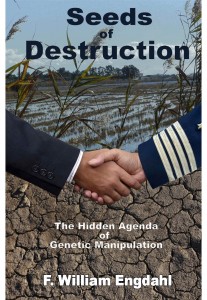
IPFS News Link • Agriculture
Seeds of Destruction: The Diabolical World of Genetic Manipulation
• Global ResearchClick here to order the book now!
"Control the oil, and you control nations. Control the food, and you control the people."* -Henry Kissenger
"Seeds of Destruction: The Hidden Agenda of Genetic Manipulation" by F. William Engdahl is a skillfully researched book that focuses on how a small socio-political American elite seeks to establish control over the very basis of human survival: the provision of our daily bread.
This is no ordinary book about the perils of GMO. Engdahl takes the reader inside the corridors of power, into the backrooms of the science labs, behind closed doors in the corporate boardrooms. The author cogently reveals a diabolical world of profit-driven political intrigue, government corruption and coercion, where genetic manipulation and the patenting of life forms are used to gain worldwide control over food production. If the book often reads as a crime story, that should come as no surprise. For that is what it is.
Engdahl's carefully argued critique goes far beyond the familiar controversies surrounding the practice of genetic modification as a scientific technique. The book is an eye-opener, a must-read for all those committed to the causes of social justice and world peace.
What follows is the Preface to "Seeds of Destruction: The Hidden Agenda of Genetic Manipulation" by F. William Engdahl (available through Global Research):
Introduction
"We have about 50% of the world's wealth but only 6.3% of its population. This disparity is particularly great as between ourselves and the peoples of Asia. In this situation, we cannot fail to be the object of envy and resentment. Our real task in the coming period is to devise a pattern of relationships which will permit us to maintain this position of disparity without positive detriment to our national security. To do so,we will have to dispense with all sentimentality and day-dreaming; and our attention will have to be concentrated everywhere on our immediate national objectives.We need not deceive ourselves that we can afford today the luxury of altruism and world-benefaction."
-George Kennan, US State Department senior planning official, 1948
This book is about a project undertaken by a small socio-political elite, centered, after the Second World War, not in London, but in Washington. It is the untold story of how this self-anointed elite set out, in Kennan's words, to "maintain this position of disparity." It is the story of how a tiny few dominated the resources and levers of power in the postwar world.
It's above all a history of the evolution of power in the control of a select few, in which even science was put in the service of that minority. As Kennan recommended in his 1948 internal memorandum, they pursued their policy relentlessly, and without the "luxury of altruism and world-benefaction."
Yet, unlike their predecessors within leading circles of the British Empire, this emerging American elite, who proclaimed proudly at war's end the dawn of their American Century, were masterful in their use of the rhetoric of altruism and world-benefaction to advance their goals. Their American Century paraded as a softer empire, a "kinder, gentler" one in which, under the banner of colonial liberation, freedom, democracy and economic development, those elite circles built a network of power the likes of which the world had not seen since the time of Alexander the Great some three centuries before Christ—a global empire unified under the military control of a sole superpower, able to decide on a whim, the fate of entire nations.
This book is the sequel to a first volume, A Century ofWar: Anglo-American Oil Politics and the New World Order. It traces a second thin red line of power. This one is about the control over the very basis of human survival, our daily provision of bread. The man who served the interests of the postwar American-based elite during the 1970's, and came to symbolize its raw realpolitik, was Secretary of State Henry Kissinger. Sometime in the mid-1970's, Kissinger, a life-long practitioner of "Balance of Power" geopolitics and a man with more than a fair share of conspiracies under his belt, allegedly declared his blueprint for world domination: "Control the oil and you control nations. Control the food, and you control the people."
The strategic goal to control global food security had its roots decades earlier, well before the outbreak of war in the late 1930's. It was funded, often with little notice, by select private foundations, which had been created to preserve the wealth and power of a handful of American families.
Originally the families centered their wealth and power in New York and along the East Coast of the United States, from Boston to New York to Philadelphia and Washington D.C. For that reason, popular media accounts often referred to them, sometimes with derision but more often with praise, as the East Coast Establishment.

























